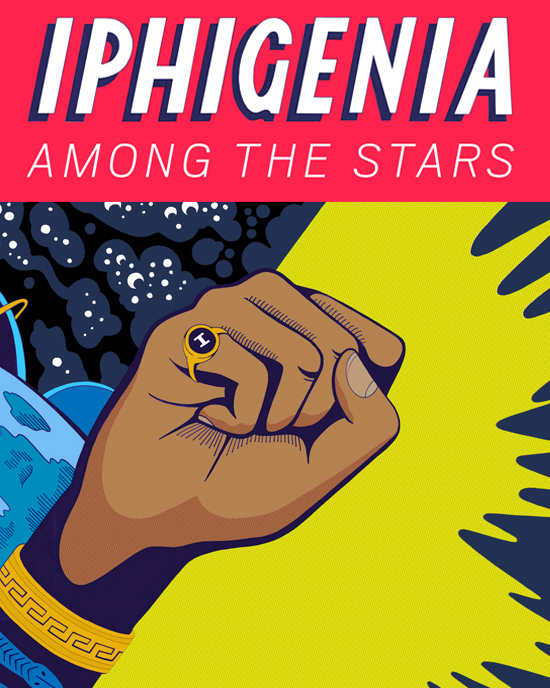Iphigenia Among the Stars
Through November 3 at the Iseman Theater, 1156 Chapel Street, New Haven. (203) 432-1234, http://drama.yale.edu/onstage/production/iphigenia-among-stars
Based on works by Euripides. Adapter and Production Dramaturg: Benjamin Fainstein. Conceived and directed by Jack Tamburri. Scenic Designer: Christopher Ash. Costume Designer: KJ Kim. Lighting Designer: Benjamin Ehrenreich. Composer and Sound Designer: Steven Brush. Projection Designer: Michael F. Bergmann. Performed by Sheria Irving (Iphigenia), Paul Pryce (Pylades, Agamemnon), Ceci Fernandez (Artemis, Clytemnestra), Mamoudou Athie (Orestes, Achilles), Winston Duke (Thoas, Menelaus), Chris Bannow (Herdsman, Old Slave) and Chorus members Marissa Neitling, Ashton Heyl and Carly Zien.
According to promotional postcard you can find in a stack on the counter of Alternate Universe, the comic book shop just down the street from where Iphigenia Among the Stars is playing at the Iseman Theater, the production is “inspired by the electrifying imagery of comic book legend Jack Kirby.”
I’m quite familiar with the works of both Euripides (my father was a classicist and theater scholar who translated and performed scads of Greek and Roman dramas) and Jack Kirby (especially his most myth-oriented series, the Fourth World and New Gods adventures he developed for DC Comics in the 1970s), and am not altogether surprised to find that these two great epic styles don’t jibe.
Euripides is all about humanizing gods and heroes by finding their tragic and vulnerable points. Kirby , conversely, is creating new gods for a world that doesn’t believe in them anymore, creating action-packed power struggles of galactic proportions. The myths are structured differently, and go in completely different directions psychologically.
There’s common ground to be explored—Kirby, with writer/editor Stan Lee, was a pioneer of the Marvel age of vulnerable superheroes with mundane everyday concerns, while Euripides found tragedy in conflicts where individuals and families are forced to make horrible choices in order to save their countries during out-of-control conflicts. But humanity is not the problem here. Superheroism is. The actors have clearly been instructed to pose imperiously, with angular arm-thrusts and grand head-cocking and other imposing gestures. But there’s no action in the piece. These survivors of wars and slaughtered siblings and global tumult stand around talking, in shiny outfits that seem like they’ve never been worn before, let alone been through long journeys or battles. There’s considerably less action in this production than you’d find in most other productions of Greek tragedies, whether ancient or modern. Granted, very little actual warfare is shown in Euripides’ war-themed plays, but the feeling of life during wartime should be constant, and it’s simply not evoked clearly here. The vague science-fiction, among-the-stars spaciness of the unanchored scenic design has something to do with that.
Director Jack Tamburri gets credit for not descending to campiness and superhero nonsense, but he doesn’t take advantage the physicality and colorfulness his chosen style affords him. The script, adapted by Benjamin Fainstein from Iphigenia Among the Taurians and Iphigenia at Aulis, uses a loping, multisyllabic, poetic style that futher hampers the exercise. Jack Kirby was an expressive artist, but he was also a fine comic-book writer who wrote with staccato percussion and crisp directness. (“I am ready for battle, Mother Box! Now find that invisible beam!”) Iphigenia Among the Stars needs more Kirby succinctness and less lines like “How will you live if you are ensconced in grief?” or “We are railing against an inescapable conclusion.”
Euripides’ Iphigenia plays are presented here as two parts of a whole, each taking half of the long three-hour evening. The events of Tauris comes first in this telling, and play lighter than the Aulis part mainly because it’s a less tragic story and the audience is still acclimating to the style. Both halves play inconsistently, with jokes jutting out from the text and upsetting the natural rhythms, or occasional over-the-top proclamations and lamentations from the actors. A large archway which doubles as a projection screen promises some visual excitement but disappoints, never becoming more than a distracting lava lamp of blurry light. Set and lighting designs clash with each other, as do acting styles. Things are either muted or bold, without an obvious rationale. Some otherwise strong performers are undercut by the confusion. Casting some of the players in more than one leading role doesn’t help: Mamoudou Athie plays Orestes in the Tauris half and Achilles in the Aulis part, an overdose of heroic chutzpah, while Ceci Fernandez must essay both Artemis and Clytemnestra. Athie and Fernandez are in fact among the most assured performers, but they’re stranded much of the time against co-stars who seem to exist in a different universe. A three-woman Greek chorus (Marissa Neitling, Ashton Heyl and Carly Zien) sings and emotes in an inconsistent member which lurches from sweet and clear and choral to anxious and excitable and ambulatory.
Iphigenia Among the Stars lacks the courage of its comic-book convictions and strangely distrusts the most surefire Greek theatrical conventions. For a production based on grand graphic statements of superheroic purpose, it lacks pomp and ceremony. What could have been a provocative musing on how we view and wield power is instead merely a talkative Halloween costume party.

